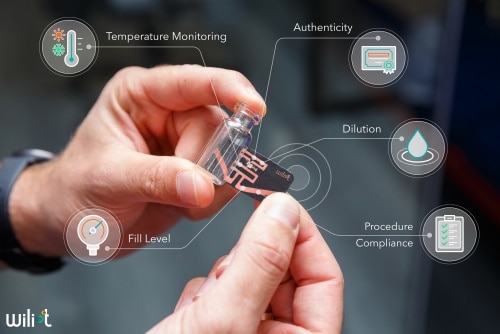WilIoT, a startup creating a low-cost, self-powered chip that attaches to products to sense physical and environment data, plans to grow its team and scale its channels for its forthcoming next-generation products that will help accelerate its vision for a new IoT.
This includes building out and scaling Wiliot’s software-as-a-service platform, as well as creating new sensors and capabilities. The company also plans to integrate with a larger set of partners and invest in silicon production capacity to ensure supply during the worldwide shortage.
The company revealed its plans after receiving US$200 million in a Series C funding round led by SoftBank Vision Fund 2.
"Wiliot has created a vision of the future of AI-enabled IoT, and we are delighted that SoftBank is supporting us in making this future a reality," said Tal Tamir, Wiliot's CEO. "IoT is a vision created around Things and our mission at Wiliot is to use cutting edge hardware, AI based sensing and an innovative business model to implement a safer and more transparent world, a world in which all the things around us help consumers use them better and suppliers avoid waste."
Softbank joins existing investors that include 83North, Amazon Web Services, Inc. (AWS), Avery Dennison, Grove Ventures, M Ventures, the corporate VC of Merck KGaA, Darmstadt, Germany, Maersk Growth, Norwest Venture Partners, NTT DOCOMO Ventures, Qualcomm Ventures LLC, Samsung Venture Investment Corp., Vintage Investment Partners, and Verizon Ventures. As part of the investment, Amit Lubovsky, Investor for SoftBank Investment Advisers, will join Wiliot's Board of Directors.
With Softbank’s Vision Fund 2 backing, Wiliot will accelerate its mission to create a new era of IoT where intelligence and connectivity are brought to trillions of products that move through global supply chains – from crates, packaging, and pallets to clothes, medicine, and perishable goods.
Adding sensing capability to the global supply chain
Wiliot has created a platform that is built on Wiliot IoT Pixels and the Wiliot Cloud. Wiliot IoT Pixels are tiny low-cost, self-powered tags that attach to any product or packaging to sense a range of physical and environment data that is then fed into the Wiliot Cloud, where machine learning algorithms translate data into actionable insights for businesses across a range of industries. The Wiliot Cloud also ensures data remains secure, private, and authentic.
Wiliot’s IoT Pixel tags are postage-stamp-size computers that continuously collect data about the world around them. They’re Bluetooth-enabled, encrypted, and designed to be manufactured into clothing, food packaging, and more. And because they harvest radio frequency energy from their surroundings, they don’t require a battery.
The self-charging nature of Wiliot’s tags make them a potentially more attractive as they don’t need a dedicated power source, receiver module, or home base, meaning they can draw energy as long as radio waves are within range.
Bringing visibility to the global supply chain
For decades, there has remained a massive gap as trillions of products travel billions of miles without any data being available as to their status, whereabouts, or situation. Lacking this information, global supply chains have been profoundly, and vulnerably, in the dark. Recognising this, many leaders in consumer-packaged goods, pharmaceuticals, furniture, and apparel have been working with Wiliot to add their sensing capabilities, intelligence and connectivity.
Effectively, products that were off-line during their manufacturing, shipping and consumption journeys are now online, a reality that is changing the way products are made, distributed, sold, used, reused, and recycled.
Wiliot-enabled products and packaging can sense temperature, fill level, motion, location changes, humidity, and proximity. Wiliot IoT Pixels can be integrated into vaccine vials, food packaging, and more, bringing real-time transparency to the supply chain, and the ability for brands for the first time to understand inventory levels throughout their retail channels. They can even understand how their products are used in customers' homes through a highly secure, privacy-protected platform.
This omniscient view of the supply chain built on people's usage allows a new paradigm called Demand Chain, which promises to slash the required capital that's non-productively tied up in inventories. Products will be able to self-reorder based on usage, accelerating the adoption of the "subscription economy" as brands transform their business models.
Specifically for Taiwan, manufacturers have been searching for technologies that can help improve supply chain management for years. Coupled with the recent announcement made by Taiwan President Tsai Ing-wen in April 2021 that Taiwan is actively working towards carbon neutrality by 2050, enterprises are in eager search of IoT solutions to enable the transformation. Meanwhile, the need to keep stock for vaccination needs also encourages surging demand from the medical sector. Upgrades on post-COVID supply chain management has become a crucial topic within Taiwan.
All this will provide consumers with increased convenience, fresher, safer food, less waste, lower medical costs and a lower environmental impact.
"By inventing the first hyper-scalable, self-powered computer that uses AI to sense the world, Wiliot is positioned to bring together the digital and physical," said Yanni Pipilis managing partner at SoftBank Investment Advisers. "We have always believed that with IoT and AI, people will live better and healthier lives – where any food or medicine has the ability to understand if it's safe to use and communicate seamlessly with people. We are pleased to play a part in helping Wiliot dramatically scale the ever-expanding application of IoT globally."



